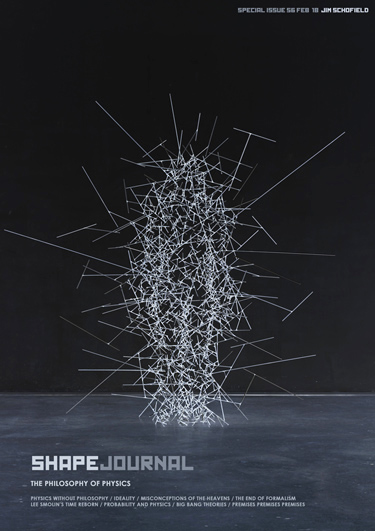
The Team
Jim Schofield - Author / Editor
Physicist, Philosopher, Marxist, Multimedia Expert, Mathematician, Author, Sculptor.
Dr. Peter Mothersole - Advisor / Editor
Senior Lecturer in Computing, Physicist, Photographer, Constructivist, Software Developer, Philosopher.
Mick Schofield - Art Director / Editor
Writer, Researcher, Photographer, Artist, Designer |
|
|
|
Special Issue 56
The Philosophy of Physics
Physics without Philosophy
Ideality
A Major Misconception of the Heavens
Time Reborn? Omissions in Lee Smolin’s stance
The End of Formalism
Why does a Probabilistic Interpretation
Emerge in Quantum Physics?
The Big Bang as an Event in a Continuing History
Premises, Premises, Premises I & II
Read PDF (Right click link to Download)
Editorial
Welcome to the 56th Special Issue of the SHAPE Journal, focusing on Philosophy and Physics.
I’ll get the first controversial statement out of the way:
There is no Philosophy of Physics! At least, not any longer.
Having committed myself to the study of Physics some 60 years ago, I chose it as my specialism at University entirely because, historically, the discipline had always tried to both understand and fully explain reality - I was then presented with a worldwide major retreat from such essential objectives, established mainly by the triumph of Bohr and Heisenberg at Solvay some years before, and the gradual acceptance of their Copenhagen Interpretation of Quantum Theory, literally everywhere.
It was, of course inevitable, though I couldn’t see it at the time. The seeds had been set long ago, with our generally pragmatic approach to investigating the physical world, which was only further complicated by the inclusion of Idealism from Mathematics, and of a Plurality underlying all attempts at explaining phenomena.
From its very outset Physics was actually a strange amalgam of Materialism, Idealism and Pragmatism, a distorted reflection of the world which could only prosper while its discoveries could be profitably used. And, the methods of carefully cultivating experimental situations (to make them easier to study), and idealistically mapping pure ideal forms onto studied situations, began to wrest the subject from its explanatory role, from ‘Natural Philosophy’, and into that of mere technological implementation.
"I am convinced that quantum mechanics is not a final theory. I believe this because I have never encountered an interpretation of the present formulation of quantum mechanics that makes sense to me. I have studied most of them in depth and thought hard about them, and in the end I still can’t make real sense of quantum theory as it stands"
Lee Smolin, 2005
In the end, the old explanations began to fail, and were abandoned for the seeking of equations. Attempts to truly understand reality were jettisoned, and what had been Physics greatest asset was lost.
|
|
|
|




